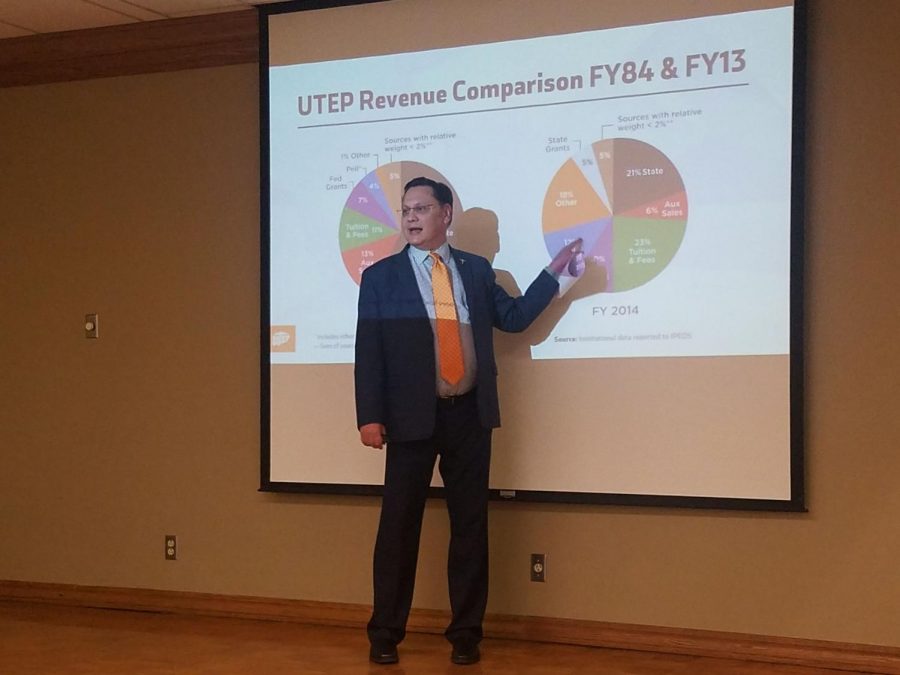Students at UTEP may be paying higher tuition and fees in the next two years, according to a tuition forum held Nov. 7.
The proposal for tuition and fees increase was unveiled during a presentation at an open forum for UTEP students, faculty and staff last week by the Division of Student Affairs.
If approved, tuition and fees could increase by an overall average of 6.44 percent for the 2018-19 academic year and by 6.24 percent for 2019-20. The increase would impact all students enrolled during those semesters.
Jacob Villanueva, senior organization and corporate communication major, plans to graduate in December 2018, and thus he will be impacted by the proposed increase.
“As a student paying for that increase, I do not like it,” Villanueva said. “UTEP has an advantage over other schools in the UT System because it has such a lower cost per semester, so I feel it will do more harm than good.”
According to information provided by Vice President of Student Affairs Gary Edens, undergraduate students taking 15 hours per semester are currently paying $3,965.
The proposed increase means students would pay around $238 more for that semester.
Edens broke down the costs between UTEP and other emerging research institutions in the state, explaining that UTEP has one of the lowest tuition and fees rates in the state and in the nation. For example, tuition and fees for an academic year at UT Dallas currently costs $12,162 per year, while UTEP students pay $7,348.
The last time UTEP saw an increase in tuition and fees was two years ago when the University of Texas System Board of Regents approved a 4.5 percent increase, which brought up the cost of tuition and fees for the 2016-17 and 2017-18 academic years.
While tuition and fees have been increasing, state funds are not. Edens said that budget cuts toward higher education by the state have also put a large dent in what the university has been able to do.
“We have tightened our belt pretty severely in the last several years to the point that we actually had a reduction in this last year’s budget,” Edens said. “We had no merit increases for faculty or staff, no one got a pay raise, and we did some very severe hiring freezes, travel and purchasing freezes that really impacted a lot of our areas.”
As the growth in enrollment continues, it has added a demand for hiring more professors. Therefore, Edens said that without increasing tuition, the requirement for more professors would not be met.
“We feel that it’s a substantial increase to the students, but we also feel that it is needed to maintain academic quality, recruit and retain the very best faculty on our campus, and to maintain the success that UTEP is seeing, not only locally but nationally,” Edens said. “With the growth in enrollment, we simply need to hire some more staff in some of our operations or we just can’t function.”
A committee made up of mostly students, along with deans and administrators, has been working for weeks to come up with a plan that will best suit the needs of the university.
The current plan would implement a differential tuition plan, meaning that a student in the College of Education would be paying less per semester than a student in the College of Engineering. Therefore, the tuition and fees increase would vary based on the college in which a student is enrolled.
“In reality, it costs more to hire an engineering or business faculty member than it does to hire an education or liberal arts faculty member,” he said.
Another reason for the differential tuition plan is because the committee believes that students who graduate with degrees in engineering and business are more likely to gain higher salaries than those who graduate with degrees in education, liberal arts and science.
If the plan is approved, students in the colleges of education, liberal arts and science would see tuition rise 5 percent for the two following academic years. Students taking 15 hours per semester would pay $4,163 in 2018-19 and $4,372 in 2019-20.
Students in the colleges of engineering and business would see the highest increase at 11 percent. Students enrolled in the College of Engineering would pay $4,403 in 2018-19 and $4,852 in 2019-20, while business students would pay $4,441 and $4,874 through those respective years.
The College of Health Sciences would see costs rise 8 percent, resulting in tuition reaching $4,268 in 2018-19 and $4,582 in 2019-20 and the School of Nursing would be increased by 9 percent, raising tuition $4,313 in 2018-2019 and $4,672 in 2019-2020.
Edens said that this is a reflection of the costs associated with operations of the colleges and institution. Also included in these costs is a $1 increase in the student service fees. Students service fees fund all student services in the university, such as the University Career Center, UTEP Counseling Center and the Center for Accommodation and Support Services.
Brittany Carlock, a senior communication major, has concerns about the increase.
“I can’t say I’m happy about the increase because now tuition is going to be about $4,000 per semester, which is starting to become unaffordable,” she said. “But I do understand that there’s not a whole lot UTEP can do about it. I know UTEP needs to find ways to keep professors here with all the students who are coming in, I just wish it would be a bit lower than 6 percent.”
Students concerned about paying for the increase should know that the tuition increase would also mean an increase in financial aid. According to Edens, 15 percent of tuition and fees must be set aside for institutional aid. Also coming back is the summer Pell Grant, which students can apply for beginning this summer.
Edens said the proposal is in its early stages and the final draft will be voted on by the student majority committee and sent to Dr. Natalicio so she can make her final changes before submitting it to the UT System Board of Regents, who will have the final vote in February.
Edens and the committee want to hear feedback from the UTEP community on the current draft and welcome all comments and suggestions.
Final proposals are due to the UT System Office of Academic Affairs on Dec. 4. Find out more about the increase at UTEP’s tuition and fees website utep.edu/tuition/.
Follow Elenie Gonzalez on Twitter @eleniegonz









